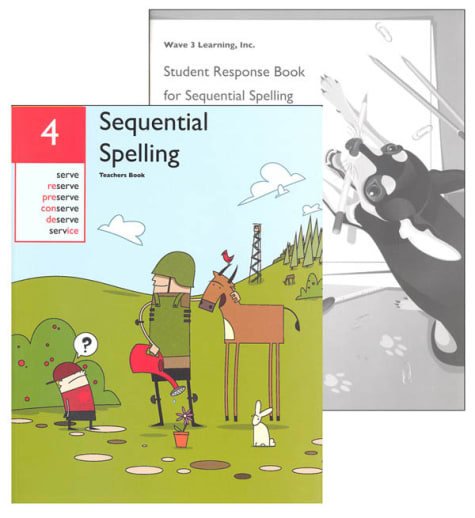Sequential Spelling is a well-organized
program that teaches spelling by word families and has a very satisfying
appeal. Imagine lists of words that are organized by word families but that go
well beyond simple vowel families (i.e., c-at, b-at, etc.) right from the
start. Although the first day's word list includes only four words (in, pin,
sin, spin), by the third day, this "in" list has expanded to pinned,
skins, twins and other "in" words and started on the
"e" (i.e., b-e, sh-e) family, even including a crossover word (begin).
By building from the easier words of a family to important power words, the
program builds self-confidence. Traditional spelling programs introduce words
"vocabularily"—in other words, based on when the child is likely to
encounter the word in reading, or on a chosen theme. As a result, word
sequences are odd and incomplete. In Sequential Spelling (Revised),
the phonics necessary for decoding is presented through the back door, so to
speak.
Every
learning channel is employed with this program. Here's the process: a word is
given verbally and used in a sentence (audio); the student attempts to spell
the word (kinesthetic); the correct spelling is given using colored markers on
a white board to differentiate between families and other letters (oral
interaction & visual); students correct their own spelling (kinesthetic).
Eager learners and definitive results are produced by utilizing the simple
educational technique of having students correct their own mistakes when they
make them—not hours, days, or even weeks later—and through creating a positive
learning environment by maintaining that mistakes are opportunities to learn.
Tests are used as learning devices, not as methods of evaluation. If you feel
compelled to give grades, written tests (reproducible) are available after the
40th, 80th, 120th, 160th, and 180th days.
The Teacher
Books (Revised) for each level hold introductory teaching information
and an overview of the approach. Next come the 180 word lists, which include
sentences for the homophones (same pronunciation, different spelling; i.e., bare
and bear) and heteronyms (same spelling, different word and different
pronunciation; i.e., bow your head, bow and arrow). The first
several days of lessons are laid out in detail and are completely scripted. In
addition to the teaching process, a positive can-do attitude is modeled in
these lessons. After the eighth day, the process continues as established. In
the lists, common words appear in bold typing. Homophones, heteronyms, and
words that do not follow the normal pattern (like "gyp") are all
marked as well. Review and repetition is built in as you progress through the
days (lists). The teacher book includes answers to the
tests and student activities for levels 1-4, and reproducible student tests
with answers for levels 5-7.
Volume
Levels are progressive but do not really conform to grade levels. For instance,
the last lessons of Level 1 include words like breathless, hedging,
horrifying, and basically, which would typically never
be seen in a first- or second-grade spelling book. Because they are introduced
as parts of word families, they become doable for the early grades. This also
means that an older student starting at Level 1 doesn't feel like he's way
behind. (By the way, the parent is given complete freedom to drop some words
from the lists if they feel it will be preferable for their child.) So, the
bottom line is that you can start any grade level student at Level 1 and
proceed through the books in order. It is recommended that children are reading
at a second-grade level before beginning Level 1, so children in first grade
may or may not be ready to begin, depending on their reading skill. Older students
may or may not need to start with Level 1, so you may want to check out the Sequential Spelling Placement Test available on our
website.
The Student
Workbooks (Revised) have pages with blank spaces for each day's
spelling lesson and an additional activity on the following page that uses
words from the lesson. Activities vary, including using words from the lesson
in a sentence, unscrambling words, filling in blanks, writing the definition of
words the student is not familiar with, and listing words that contain a
particular word family (like “ake”). Student Workbooks are available for Levels
1-5.
The Student
Response Book provides writing space for the daily word lists and can
be used with any level of the program, although the Student Activity Books at
the early levels provide more review and repetition. Looking at these books,
you might scratch your head. The column for the first day’s words is in the
middle of page 3 (with the 61st day on the left and the 121st day on the
right). We don't see the 2nd day column until page 5. This peculiar arrangement
is designed to prevent the child from copying words and/or word family parts
from one day to the next, a tendency which gets in the way of truly learning
the pattern. Once you figure out the system, it makes perfect sense. Although a
student will need one book per level, the response book is not level-specific.
We
offer Level Sets that include both the Teacher Book and
Student Book for each level and also sets that include the Teacher Book and the
Student Response Book.
This
is a well-organized program that offers a multi-sensory approach, making it
perfect for many students. ~ Janice

